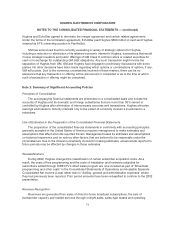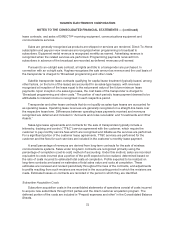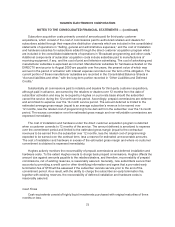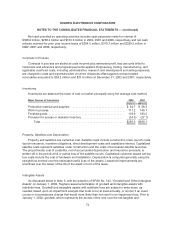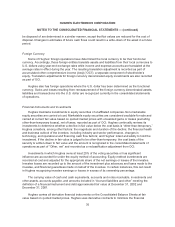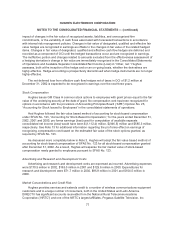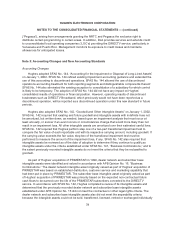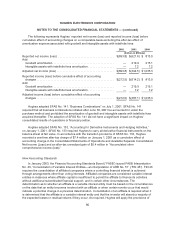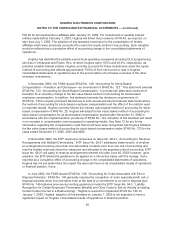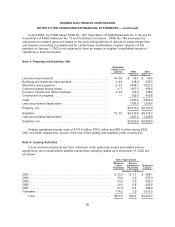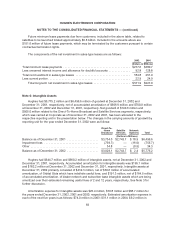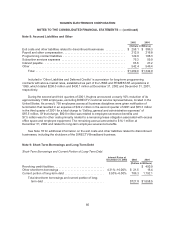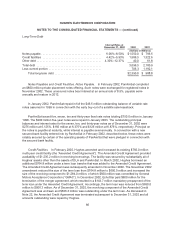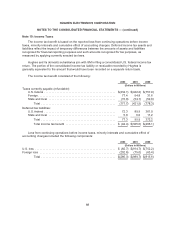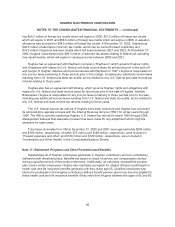DIRECTV 2002 Annual Report Download - page 91
Download and view the complete annual report
Please find page 91 of the 2002 DIRECTV annual report below. You can navigate through the pages in the report by either clicking on the pages listed below, or by using the keyword search tool below to find specific information within the annual report.HUGHES ELECTRONICS CORPORATION
NOTES TO THE CONSOLIDATED FINANCIAL STATEMENTS — (continued)
FIN 46 for all investments in affiliates after January 31, 2003. For investments in variable interest
entities made before February 1, 2003, Hughes will follow the provisions of FIN 46, as required, no
later than July 1, 2003. The adoption of this standard could result in the consolidation of certain
affiliates which were previously accounted for under the equity method of accounting. Such adoption
would be reflected as a cumulative effect of accounting change in the consolidated statements of
operations.
Hughes has identified the partially-owned local operating companies providing DLA programming
services in Venezuela and Puerto Rico, of which Hughes owns 19.5% and 40.0%, respectively, as
potential variable interest entities. Hughes currently accounts for these investments under the equity
method of accounting and reflects approximately 75.0% of their net income or loss in Hughes’
consolidated statements of operations due to the accumulation of net losses in excess of the other
investors’ investments.
In December 2002, the FASB issued SFAS No. 148, “Accounting for Stock-Based
Compensation—Transition and Disclosure—an amendment of SFAS No. 123.” This statement amends
SFAS No. 123, “Accounting for Stock-Based Compensation,” to provide two alternative methods of
transition for a voluntary change to the fair value based method of accounting for stock-based
employee compensation. In addition, this statement amends the disclosure requirements of
SFAS No. 123 to require prominent disclosures in both annual and interim financial statements about
the method of accounting for stock-based employee compensation and the effect of the method used
on reported results. Hughes currently follows the intrinsic value based method of accounting for stock-
based compensation of APB No. 25. Hughes will adopt the fair value based method of accounting for
stock-based compensation for all stock-based compensation granted after December 31, 2002 in
accordance with the original transition provisions of SFAS No. 123. Adoption of this standard will result
in an increase in compensation cost recognized in operating results. See Note 13 for pro forma
information regarding the compensation costs that would have been recognized had Hughes followed
the fair value based method of accounting for stock-based compensation under SFAS No. 123 for the
years ended December 31, 2002, 2001 and 2000.
In November 2002, the EITF reached a consensus on Issue No. 00-21, “Accounting for Revenue
Arrangements with Multiple Deliverables.” EITF Issue No. 00-21 addresses determination of whether
an arrangement involving more than one deliverable contains more than one unit of accounting and
how the related revenues should be measured and allocated to the separate units of accounting. EITF
Issue No. 00-21 will apply to revenue arrangements entered into after June 30, 2003; however, upon
adoption, the EITF allows the guidance to be applied on a retroactive basis, with the change, if any,
reported as a cumulative effect of accounting change in the consolidated statements of operations.
Hughes has not yet determined the impact this issue will have on its consolidated results of operations
or financial position, if any.
In June 2002, the FASB issued SFAS No. 146, “Accounting for Costs Associated with Exit or
Disposal Activities.” SFAS No. 146 generally requires the recognition of costs associated with exit or
disposal activities when incurred rather than at the date of a commitment to an exit or disposal plan.
SFAS No. 146 replaces previous accounting guidance provided by EITF Issue No. 94-3, “Liability
Recognition for Certain Employee Termination Benefits and Other Costs to Exit an Activity (including
Certain Costs Incurred in a Restructuring).” Hughes is required to implement SFAS No. 146 on
January 1, 2003. Hughes’ adoption of this standard on January 1, 2003 is not expected to have a
significant impact on Hughes’ consolidated results of operations or financial position.
81


